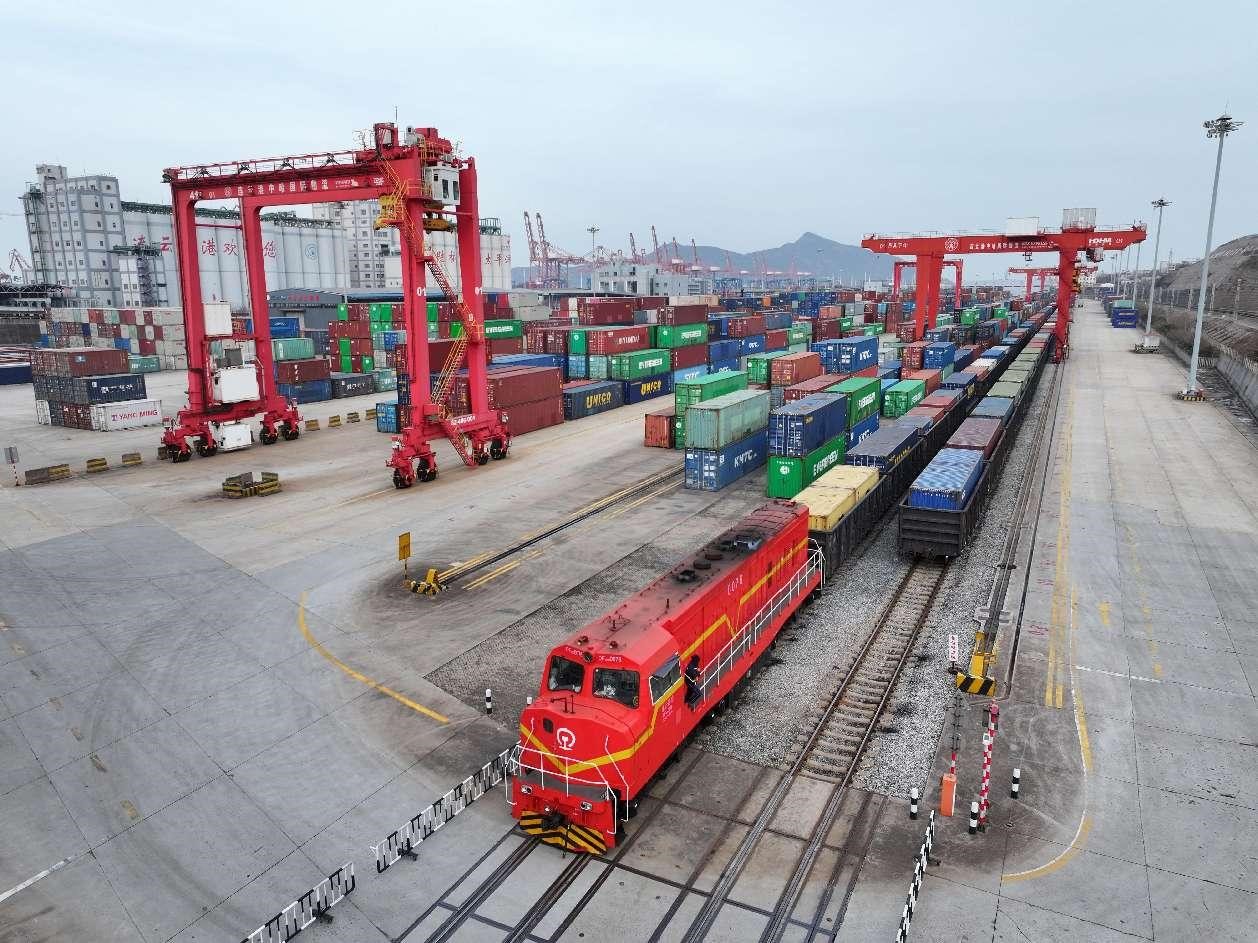China continues to expand high-level opening up in 2025
Opening up is a distinct hallmark of Chinese modernization.
Since the beginning of 2025, various regions and government departments in China have been steadily enhancing institutional opening up and voluntarily subscribing to high-standard international economic and trade rules.
Leveraging the strengths of its enormous market, China has been enhancing its capacity for opening up while expanding international cooperation with other countries, and developing new institutions for a higher-standard open economy.

Foreign tourists take photos in Shanghai's Yuyuan Garden, Jan. 27, 2025. (People's Daily Online/Wang Chu)
On Jan. 1, the China-Maldives Free Trade Agreement (FTA) officially took effect, leading to zero tariffs on over 95 percent of tariff lines and import value between the two countries.
"Following the implementation of the FTA, import tariffs on washing machines in the Maldives dropped from 20 percent to zero," said Wu Tong, an executive from Hisense International, the overseas business branch of Chinese multinational major appliance and electronics manufacturer Hisense Group.
"This year, we expect to benefit from tariff reductions totaling nearly 420,000 yuan ($57,920) on our home appliance exports to the Maldives," Wu said.
China has been proactively aligning with high-standard international economic and trade rules, and expanding the globally-oriented network of high-standard free trade areas.
"In 2025, our FTA negotiation agenda remains substantial," said Li Yongjie, deputy international trade representative of China's Ministry of Commerce.
According to the official, China will negotiate with additional interested countries and regions to expand its global network of high-standard free trade areas. At the same time, the country will ensure high-quality implementation of existing FTAs, so that these agreements can better serve businesses and people in both China and its free trade partners, said Li.
The impact of China's opening up extends beyond trade figures. "When an engineer in New York flies a drone made in Shenzhen, when a young girl in Paris wears traditional Chinese costume from Guangzhou, or when an African family plays with toys from Chaoshan area, it goes beyond the flow of goods - it's about the sharing of technology and exchanges of culture," said Luo Huanghao, deputy mayor of Shenzhen Municipal People's Government at the Guangdong Provincial High-quality Development Conference on Feb. 5.

Cross-border e-commerce containers are unloaded from a foreign vessel at the Shidao Xingang port in Rongcheng, east China's Shandong province, Feb. 14, 2025. (People's Daily Online/Yang Zhili)
According to Luo, Shenzhen, now a global hub for cross-border e-commerce, is home to 120,000 cross-border e-commerce sellers and hosts four-fifths of the world's top 20 cross-border e-commerce platforms.
In 2024, the value of China's cross-border e-commerce imports and exports reached 2.63 trillion yuan, marking a 10.8 percent growth, unlocking even greater potential for the country in both "selling to the world" and "buying from the world."
Since the beginning of this year, an increasing number of foreign investors have chosen to invest in China.
On Jan. 6, German automobile giant Volkswagen and Chinese new energy vehicle maker XPENG announced that they had signed a memorandum of understanding for strategic collaboration on a superfast charging network in China. On Jan. 15, Italy-based PiovanGroup opened its Asia-Pacific headquarters and a new facility in Suzhou, east China's Jiangsu province. On Jan. 23, French multinational Air Liquide signed an agreement with Chinese enterprises in Yancheng, Jiangsu, to co-develop a green methanol project powered by biogas.
In 2025, China will continue to stabilize foreign investment, offering foreign investors a sound business environment where they can operate with confidence.
First, China has vowed to further shorten the negative list for foreign investment, making it easier for foreign-invested enterprises to access the Chinese market.
In 2024, the country further eased market access for foreign investors, including allowing the establishment of wholly foreign-owned hospitals in certain cities and regions, including Beijing, Tianjin, and Shanghai, and removing all market access restrictions for foreign investors in the manufacturing sector. As a result, 59,080 new foreign-invested enterprises were established nationwide in 2024, up 9.9 percent year on year.

A fully loaded China-Europe freight train departs from the China-Kazakhstan (Lianyungang) Logistics Cooperation Base in Lianyungang, east China's Jiangsu province, Feb. 6, 2025. (People's Daily Online/Wang Chun)
According to He Yadong, spokesperson for China's Ministry of Commerce, in 2025, China will steadily advance the opening up of its services sector, expanding its pilot programs to open up fields such as telecommunications, medical services, and education. Additionally, it will work on expanding the catalog of encouraged industries for foreign investment to attract even more foreign investment.
Second, China will continue to improve its business environment and create a stable, transparent, and predictable policy environment.
On Feb. 5, Shanghai hosted its annual Business Environment Optimization Conference, unveiling action plan 8.0 version to further improve the city's business environment. This marked the eighth consecutive year that Shanghai has held the city-wide business environment conference on the first working day after the Spring Festival holiday.
According to Simon Yang, president of Aptiv for China and the Asia Pacific region, international enterprises often encounter varying local regulations when operating and investing in different countries. But Shanghai stands out for its consistent policies on tax incentives, streamlined approval procedures, and regulatory stability, said Yang.
By fostering a market environment for fair competition, where all business entities can equally access resources and compete on a level playing field, China is creating a world-class business environment while advancing high-level opening up, which is bound to propel the country's open economy to new heights.
Photos
Related Stories
- Multiple legal, policy measures take effect in China
- Negative list, zero-tariff treatment exemplify China's intensified efforts in opening up
- Zero-tariff treatment for LDCs mirrors China's commitment to high-level opening up
- To understand China's reform and opening up via two sets of data
- Global financial community gathers for Sibos 2024 in Beijing as China accelerates steps in financial opening up
Copyright © 2025 People's Daily Online. All Rights Reserved.









